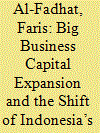| Srl | Item |
| 1 |
ID:
188438


|
|
|
|
|
| Summary/Abstract |
This paper aims to examine the recent international capital expansion of Indonesian business groups, which has received little attention by existing literatures. The article looks at the geo-political and economic conditions benefited their capital expansion across the region and how such internationalisation process has substantial impacts toward Indonesia’s global economic outlook. This research applied a qualitative method of collecting and categorizing data by using the international political economy approach, specifically the Amsterdam School of International Political Economy and Murdoch School of Political Economy. The data time period is from 1999 to 2020. The research’s empirical findings propose two arguments. First, the internationalisation of Indonesian conglomerate’s capital should not merely be considered a product of corporate strategies. It is largely benefited by regional governance of ASEAN-led economic integration initiative. Second, while such international business expansion serves Indonesia’s ambition to become Southeast Asia’s economic hub, it also is reconfiguring the country’s preferences regarding global economic policy.
|
|
|
|
|
|
|
|
|
|
|
|
|
|
|
|
| 2 |
ID:
188426


|
|
|
|
|
| Summary/Abstract |
Multilateralism at the regional and global stage is essential for Indonesia’s foreign policy. Apart from ASEAN, which has long been a pivotal array for Indonesia’s regional economic interdependence and political stability, the G20 is recently added to the country’s interest. It serves Indonesia’s desire for global leadership and middle-power status. As Indonesia began its year-long presidency of the G20 in 2022, the government is confident that hosting numerous meetings and the Group’s summit at the end of 2022 is a notable milestone for its international leadership exposure. This time, Indonesia’s President Joko Widodo emphasises priority agendas: strengthening global health architecture, transitioning to green and renewable energy, and promoting the digital economy. This commentary evaluates and projects Indonesia’s G20 presidency amidst the country’s democratic decline in recent years. It argues that Indonesia’s proposed agendas are more ambitious goals than strategic. Instead, the country’s priority will be marked by a solid neoliberal economic policy and stability, which is likely to cause even more democratic setbacks at home.
|
|
|
|
|
|
|
|
|
|
|
|
|
|
|
|
| 3 |
ID:
179353


|
|
|
|
|
| Summary/Abstract |
India's textile industry is among the largest in the world and contributes significantly to India's GDP and economic growth. As the second largest total exporter globally after China with more than 45 million workers, India's textile industry has long been the subject of criticism concerning labour exploitation and environmental damage. Since 2016, nevertheless, Narendra Modi's government has started to take a different yet somewhat perplexing approach to introducing and environmentally friendlier and more sustainable direction in its textile industry. This article aims to comprehend the reasons behind India's new policy arguing that—despite such changes—environmental sustainability has not become India's full concern in the textile sector at the moment. Such a shift was part of India's international market expansion strategy towards the European Union market which had imposed non—tariff import restrictions on India's textile products. This article also shows contradictions and tensions in the government's eco—friendly textile policy concerning its high production costs and India's yet dependence on conventional production systems.
|
|
|
|
|
|
|
|
|
|
|
|
|
|
|
|